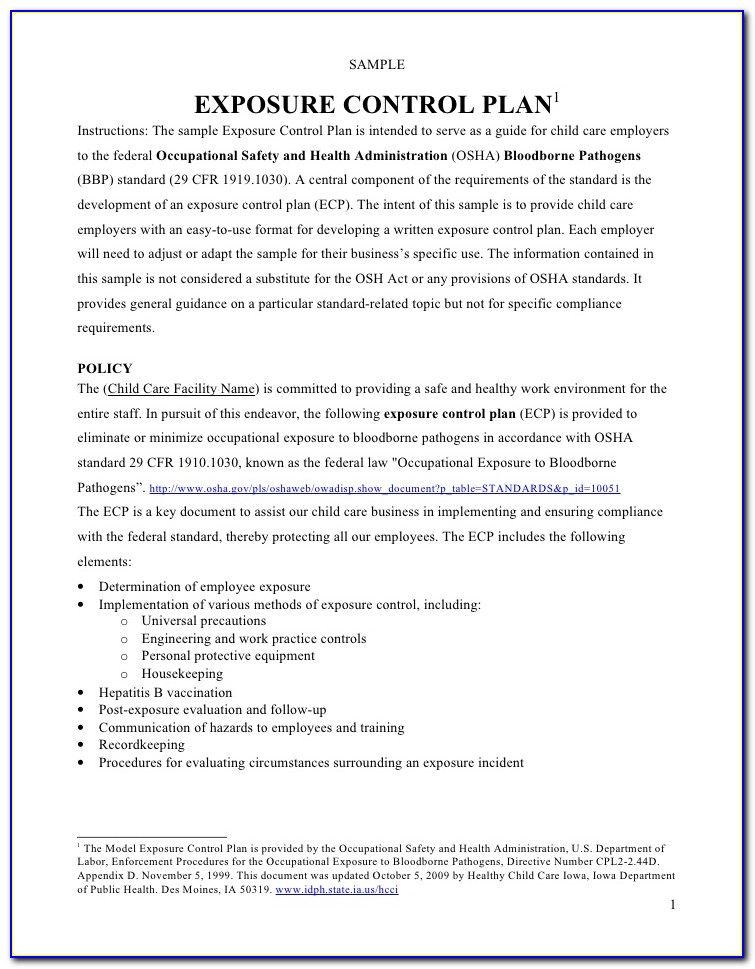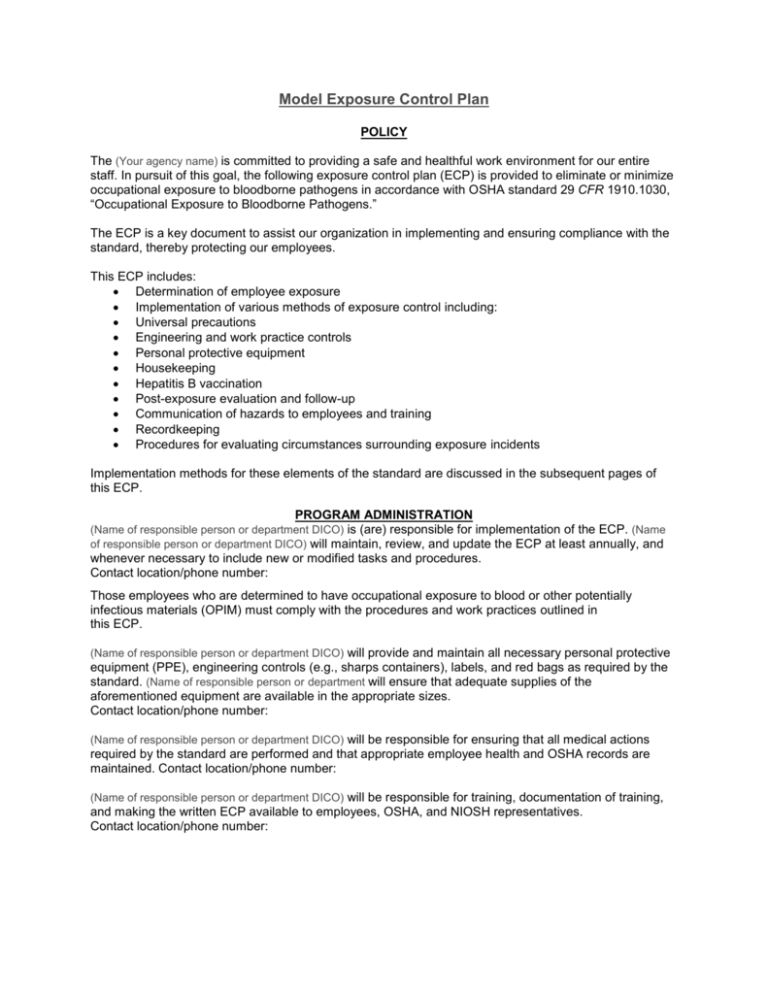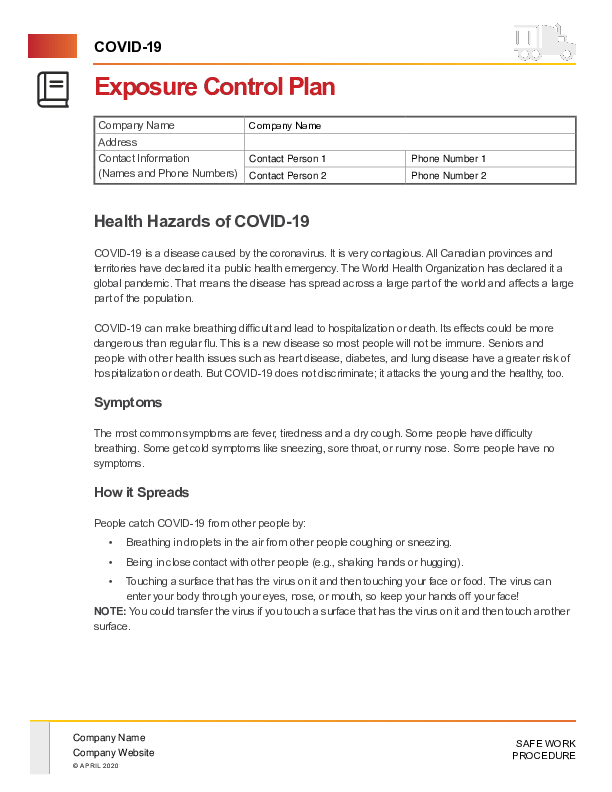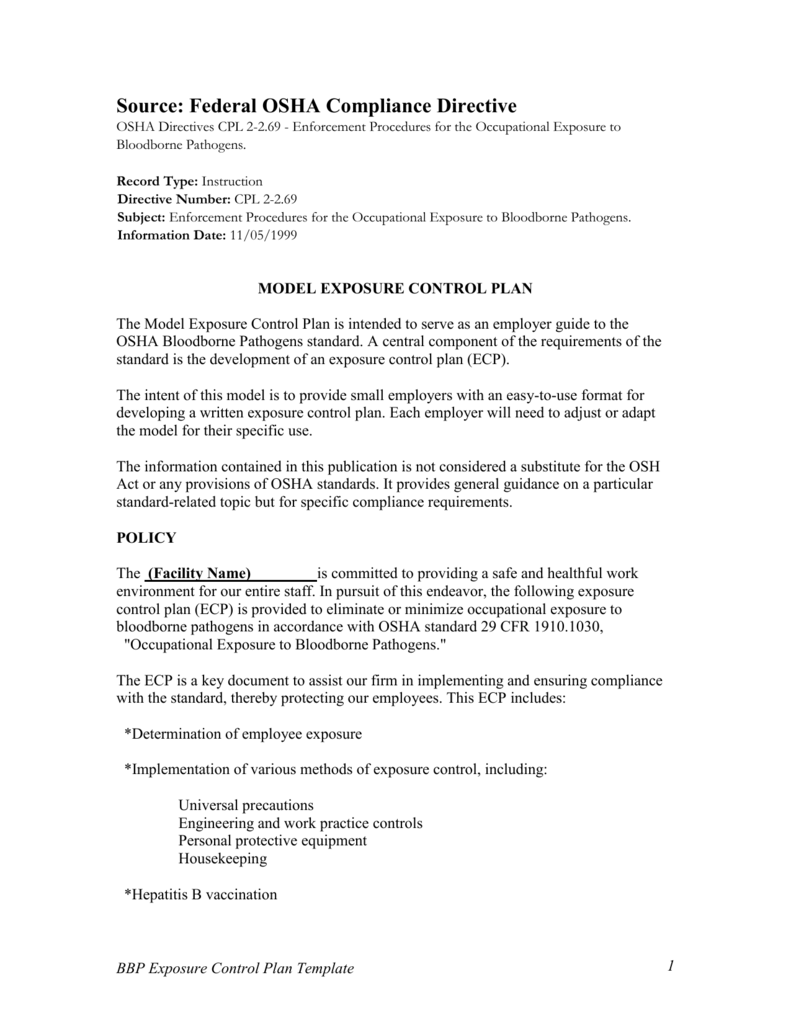Exposure Control Plan Template
Exposure Control Plan Template - Web the intent of this exposure control plan is to prevent bloodborne infections by eliminating or minimizing employee exposures to blood, blood products, and other potentially infectious materials (opim). This sample plan was included in osha's proposed tuberculosis standard (appendix f to proposed 29 cfr 1910.1035, 62 fed. Web example exposure control plan this example exposure control plan is designed to provide employees with a practical example of an exposure control plan, as is required under the bloodborne pathogens standard. Web this document is the written exposure control plan for the lab as required by the bloodborne pathogens standard. Web sample exposure control plan. Bloodborne pathogens exposure control plan. This template provides an abbreviated format which is to be utilized in conjunction with the pi’s biological hazard registration (bioraft safety management system) and laboratory biosafety manual for development of a complete ecp. A central component of the requirements of the standard is the development of. Web the following model for an exposure control plan includes all elements required by the osha bloodborne pathogens standard (29 cfr 1910.1030). The primary purpose of an exposure control plan is to limit or reduce the risk of occupational exposure to infectious substances as required by the osha bloodborne pathogen standard, osha 1910.1030: 17, 1997), but osha withdrew the proposed rule in may 2003. This template provides an abbreviated format which is to be utilized in conjunction with the pi’s biological hazard registration (bioraft safety management system) and laboratory biosafety manual for development of a complete ecp. Web the primary purpose of an ecp is to limit or reduce the risk of exposure. It details in writing your plan for reducing exposures to blood and explains what steps to take if an exposure occurs. Web sample exposure control plan. Web the primary purpose of an ecp is to limit or reduce the risk of exposure to bbps. 17, 1997), but osha withdrew the proposed rule in may 2003. Web the following model for. Web the intent of this exposure control plan is to prevent bloodborne infections by eliminating or minimizing employee exposures to blood, blood products, and other potentially infectious materials (opim). Web an exposure control plan is the focal point of any bloodborne pathogens exposure prevention program. Web example exposure control plan this example exposure control plan is designed to provide employees. The plan specifies all steps taken by your facility to protect your workers. Web an exposure control plan is the focal point of any bloodborne pathogens exposure prevention program. This sample plan was included in osha's proposed tuberculosis standard (appendix f to proposed 29 cfr 1910.1035, 62 fed. To establish the requirements of an exposure control plan as defined in. Web sample exposure control plan. Web the intent of this exposure control plan is to prevent bloodborne infections by eliminating or minimizing employee exposures to blood, blood products, and other potentially infectious materials (opim). Web the following model for an exposure control plan includes all elements required by the osha bloodborne pathogens standard (29 cfr 1910.1030). Web this document is. Part of osha's etools for hospitals and nursing homes. Web example exposure control plan this example exposure control plan is designed to provide employees with a practical example of an exposure control plan, as is required under the bloodborne pathogens standard. The plan specifies all steps taken by your facility to protect your workers. This sample plan was included in. Web the model exposure control plan is intended to serve employers as an example exposure control plan which is required by the bloodborne pathogens standard. Part of osha's etools for hospitals and nursing homes. Web the primary purpose of an ecp is to limit or reduce the risk of exposure to bbps. This sample plan was included in osha's proposed. Web the primary purpose of an ecp is to limit or reduce the risk of exposure to bbps. Web this document is the written exposure control plan for the lab as required by the bloodborne pathogens standard. Bloodborne pathogens exposure control plan. The plan specifies all steps taken by your facility to protect your workers. This sample plan was included. Web sample exposure control plan. Web the model exposure control plan is intended to serve employers as an example exposure control plan which is required by the bloodborne pathogens standard. This template provides an abbreviated format which is to be utilized in conjunction with the pi’s biological hazard registration (bioraft safety management system) and laboratory biosafety manual for development of. Part of osha's etools for hospitals and nursing homes. The plan specifies all steps taken by your facility to protect your workers. This template provides an abbreviated format which is to be utilized in conjunction with the pi’s biological hazard registration (bioraft safety management system) and laboratory biosafety manual for development of a complete ecp. This sample plan was included. This sample plan was included in osha's proposed tuberculosis standard (appendix f to proposed 29 cfr 1910.1035, 62 fed. 17, 1997), but osha withdrew the proposed rule in may 2003. Web an exposure control plan is the focal point of any bloodborne pathogens exposure prevention program. Web the primary purpose of an ecp is to limit or reduce the risk of exposure to bbps. A central component of the requirements of the standard is the development of. The primary purpose of an exposure control plan is to limit or reduce the risk of occupational exposure to infectious substances as required by the osha bloodborne pathogen standard, osha 1910.1030: The plan specifies all steps taken by your facility to protect your workers. Bloodborne pathogens exposure control plan. This template provides an abbreviated format which is to be utilized in conjunction with the pi’s biological hazard registration (bioraft safety management system) and laboratory biosafety manual for development of a complete ecp. Web this document is the written exposure control plan for the lab as required by the bloodborne pathogens standard. Web the intent of this exposure control plan is to prevent bloodborne infections by eliminating or minimizing employee exposures to blood, blood products, and other potentially infectious materials (opim). Web the model exposure control plan is intended to serve employers as an example exposure control plan which is required by the bloodborne pathogens standard. Part of osha's etools for hospitals and nursing homes. It details in writing your plan for reducing exposures to blood and explains what steps to take if an exposure occurs.
Exposure Control Plan Fillable Template

Model Sample Exposure Control Plan (Word)

Osha Exposure Control Plan Template

Exposure Control Plan (ECP)

Exposure Control Plan (Word) Safety Driven TSCBC

osha exposure control plan template Doc Template pdfFiller

Osha Exposure Control Plan Template
Lead WorkSafeBC

Templates Bloodborne Pathogens and BBP Exposure Control Plan Doc

Construction Dust Control Plan Template
Web Sample Exposure Control Plan.
To Establish The Requirements Of An Exposure Control Plan As Defined In Osha's Bloodborne Pathogens Standard 29 Cfr 1910.1030 And Cal Osha’s Bloodborne Pathogens Standard Ccr Title 8, Section 5193.
Web Example Exposure Control Plan This Example Exposure Control Plan Is Designed To Provide Employees With A Practical Example Of An Exposure Control Plan, As Is Required Under The Bloodborne Pathogens Standard.
Web The Following Model For An Exposure Control Plan Includes All Elements Required By The Osha Bloodborne Pathogens Standard (29 Cfr 1910.1030).
Related Post:
